Critical Analysis of Research Report: Laryngectomy and Quality of Life
VerifiedAdded on 2023/03/17
|10
|3384
|33
Report
AI Summary
This report presents a comprehensive critical analysis of a research study by Perry, Casey, and Cotton (2015), which investigated the quality of life (QoL) of advanced laryngeal cancer patients post-total laryngectomy. The analysis evaluates various aspects of the research, including the credibility of the title, abstract, literature review, methodology, data collection methods, and statistical analysis. The critique highlights both the strengths and weaknesses of the study, such as the informative abstract, the relevance of the research rationale, and the use of hierarchical regression models. The analysis also points out limitations, including the lack of detailed ethical considerations, unclear documentation of participant selection criteria, and the absence of a clear rationale for the study design. The report examines the study's hypothesis, variables, sample size, and data analysis procedures, providing an overall assessment of the study's validity, reliability, and generalizability. The report concludes by assessing the implications of the findings and their alignment with evidence-based literature, thereby offering a detailed evaluation of the research's contribution to the understanding of QoL in laryngectomy patients.
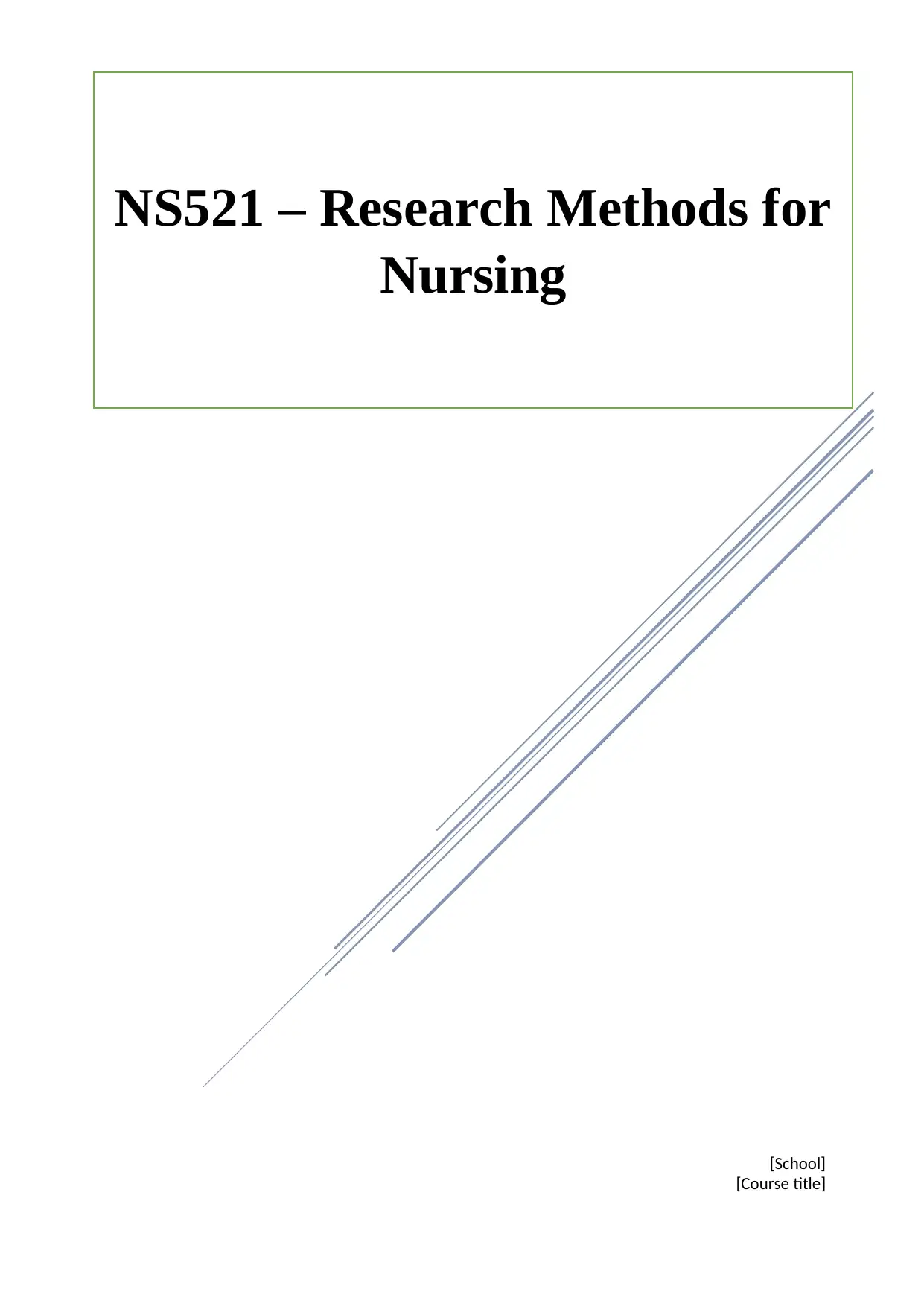
[School]
[Course title]
[Document title]
[Document subtitle]
NS521 – Research Methods for
Nursing
[Course title]
[Document title]
[Document subtitle]
NS521 – Research Methods for
Nursing
Paraphrase This Document
Need a fresh take? Get an instant paraphrase of this document with our AI Paraphraser
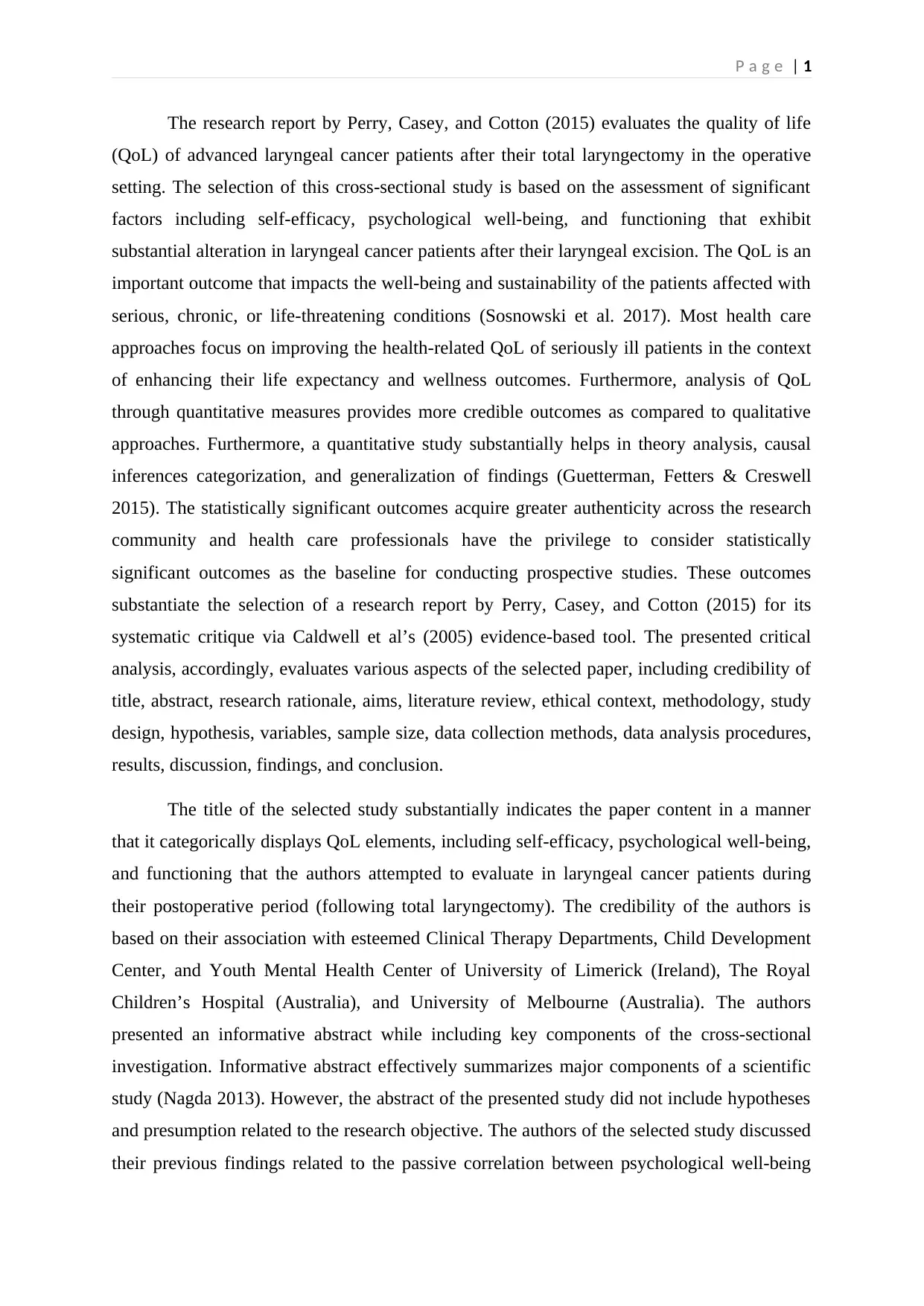
P a g e | 1
The research report by Perry, Casey, and Cotton (2015) evaluates the quality of life
(QoL) of advanced laryngeal cancer patients after their total laryngectomy in the operative
setting. The selection of this cross-sectional study is based on the assessment of significant
factors including self-efficacy, psychological well-being, and functioning that exhibit
substantial alteration in laryngeal cancer patients after their laryngeal excision. The QoL is an
important outcome that impacts the well-being and sustainability of the patients affected with
serious, chronic, or life-threatening conditions (Sosnowski et al. 2017). Most health care
approaches focus on improving the health-related QoL of seriously ill patients in the context
of enhancing their life expectancy and wellness outcomes. Furthermore, analysis of QoL
through quantitative measures provides more credible outcomes as compared to qualitative
approaches. Furthermore, a quantitative study substantially helps in theory analysis, causal
inferences categorization, and generalization of findings (Guetterman, Fetters & Creswell
2015). The statistically significant outcomes acquire greater authenticity across the research
community and health care professionals have the privilege to consider statistically
significant outcomes as the baseline for conducting prospective studies. These outcomes
substantiate the selection of a research report by Perry, Casey, and Cotton (2015) for its
systematic critique via Caldwell et al’s (2005) evidence-based tool. The presented critical
analysis, accordingly, evaluates various aspects of the selected paper, including credibility of
title, abstract, research rationale, aims, literature review, ethical context, methodology, study
design, hypothesis, variables, sample size, data collection methods, data analysis procedures,
results, discussion, findings, and conclusion.
The title of the selected study substantially indicates the paper content in a manner
that it categorically displays QoL elements, including self-efficacy, psychological well-being,
and functioning that the authors attempted to evaluate in laryngeal cancer patients during
their postoperative period (following total laryngectomy). The credibility of the authors is
based on their association with esteemed Clinical Therapy Departments, Child Development
Center, and Youth Mental Health Center of University of Limerick (Ireland), The Royal
Children’s Hospital (Australia), and University of Melbourne (Australia). The authors
presented an informative abstract while including key components of the cross-sectional
investigation. Informative abstract effectively summarizes major components of a scientific
study (Nagda 2013). However, the abstract of the presented study did not include hypotheses
and presumption related to the research objective. The authors of the selected study discussed
their previous findings related to the passive correlation between psychological well-being
The research report by Perry, Casey, and Cotton (2015) evaluates the quality of life
(QoL) of advanced laryngeal cancer patients after their total laryngectomy in the operative
setting. The selection of this cross-sectional study is based on the assessment of significant
factors including self-efficacy, psychological well-being, and functioning that exhibit
substantial alteration in laryngeal cancer patients after their laryngeal excision. The QoL is an
important outcome that impacts the well-being and sustainability of the patients affected with
serious, chronic, or life-threatening conditions (Sosnowski et al. 2017). Most health care
approaches focus on improving the health-related QoL of seriously ill patients in the context
of enhancing their life expectancy and wellness outcomes. Furthermore, analysis of QoL
through quantitative measures provides more credible outcomes as compared to qualitative
approaches. Furthermore, a quantitative study substantially helps in theory analysis, causal
inferences categorization, and generalization of findings (Guetterman, Fetters & Creswell
2015). The statistically significant outcomes acquire greater authenticity across the research
community and health care professionals have the privilege to consider statistically
significant outcomes as the baseline for conducting prospective studies. These outcomes
substantiate the selection of a research report by Perry, Casey, and Cotton (2015) for its
systematic critique via Caldwell et al’s (2005) evidence-based tool. The presented critical
analysis, accordingly, evaluates various aspects of the selected paper, including credibility of
title, abstract, research rationale, aims, literature review, ethical context, methodology, study
design, hypothesis, variables, sample size, data collection methods, data analysis procedures,
results, discussion, findings, and conclusion.
The title of the selected study substantially indicates the paper content in a manner
that it categorically displays QoL elements, including self-efficacy, psychological well-being,
and functioning that the authors attempted to evaluate in laryngeal cancer patients during
their postoperative period (following total laryngectomy). The credibility of the authors is
based on their association with esteemed Clinical Therapy Departments, Child Development
Center, and Youth Mental Health Center of University of Limerick (Ireland), The Royal
Children’s Hospital (Australia), and University of Melbourne (Australia). The authors
presented an informative abstract while including key components of the cross-sectional
investigation. Informative abstract effectively summarizes major components of a scientific
study (Nagda 2013). However, the abstract of the presented study did not include hypotheses
and presumption related to the research objective. The authors of the selected study discussed
their previous findings related to the passive correlation between psychological well-being
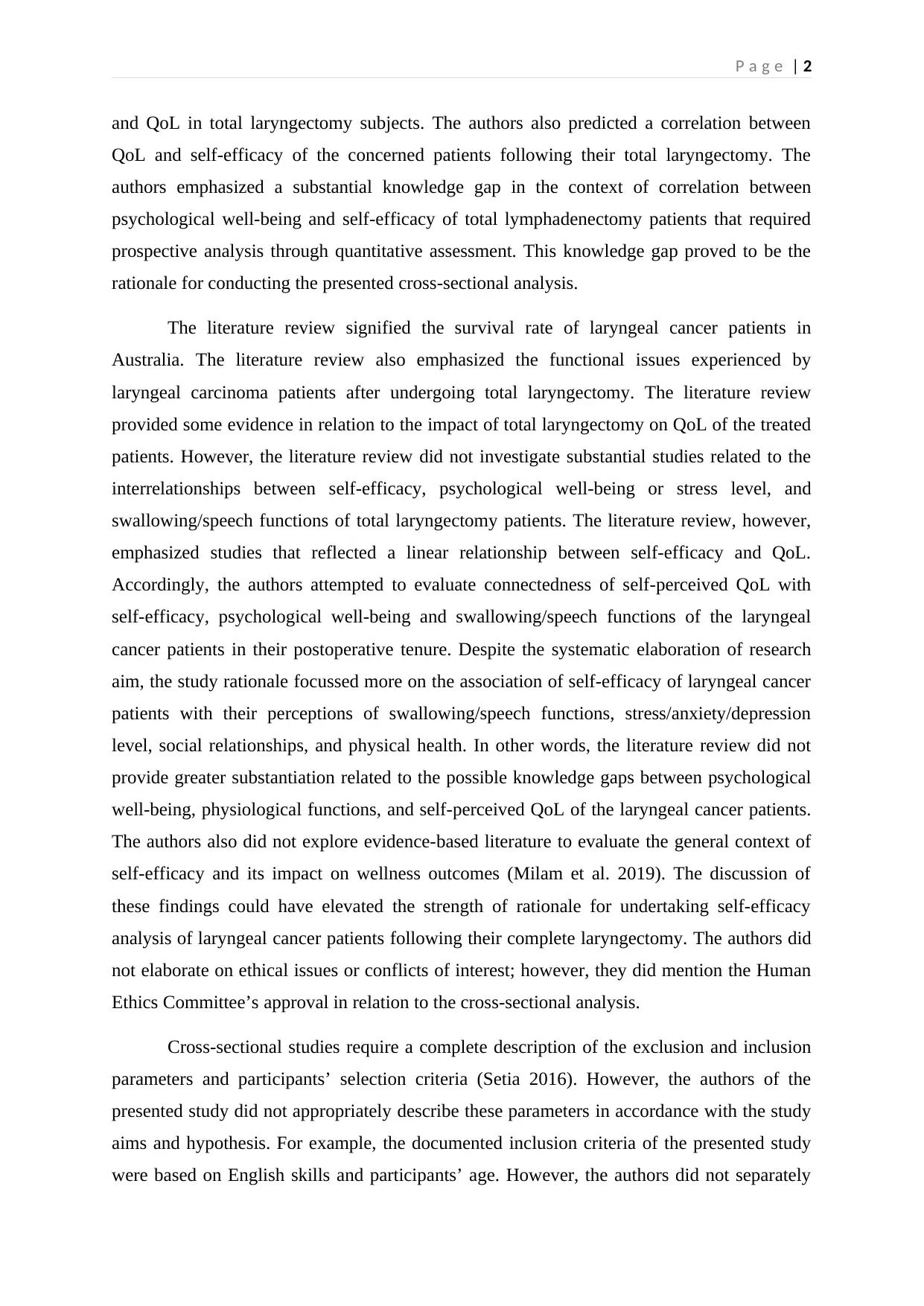
P a g e | 2
and QoL in total laryngectomy subjects. The authors also predicted a correlation between
QoL and self-efficacy of the concerned patients following their total laryngectomy. The
authors emphasized a substantial knowledge gap in the context of correlation between
psychological well-being and self-efficacy of total lymphadenectomy patients that required
prospective analysis through quantitative assessment. This knowledge gap proved to be the
rationale for conducting the presented cross-sectional analysis.
The literature review signified the survival rate of laryngeal cancer patients in
Australia. The literature review also emphasized the functional issues experienced by
laryngeal carcinoma patients after undergoing total laryngectomy. The literature review
provided some evidence in relation to the impact of total laryngectomy on QoL of the treated
patients. However, the literature review did not investigate substantial studies related to the
interrelationships between self-efficacy, psychological well-being or stress level, and
swallowing/speech functions of total laryngectomy patients. The literature review, however,
emphasized studies that reflected a linear relationship between self-efficacy and QoL.
Accordingly, the authors attempted to evaluate connectedness of self-perceived QoL with
self-efficacy, psychological well-being and swallowing/speech functions of the laryngeal
cancer patients in their postoperative tenure. Despite the systematic elaboration of research
aim, the study rationale focussed more on the association of self-efficacy of laryngeal cancer
patients with their perceptions of swallowing/speech functions, stress/anxiety/depression
level, social relationships, and physical health. In other words, the literature review did not
provide greater substantiation related to the possible knowledge gaps between psychological
well-being, physiological functions, and self-perceived QoL of the laryngeal cancer patients.
The authors also did not explore evidence-based literature to evaluate the general context of
self-efficacy and its impact on wellness outcomes (Milam et al. 2019). The discussion of
these findings could have elevated the strength of rationale for undertaking self-efficacy
analysis of laryngeal cancer patients following their complete laryngectomy. The authors did
not elaborate on ethical issues or conflicts of interest; however, they did mention the Human
Ethics Committee’s approval in relation to the cross-sectional analysis.
Cross-sectional studies require a complete description of the exclusion and inclusion
parameters and participants’ selection criteria (Setia 2016). However, the authors of the
presented study did not appropriately describe these parameters in accordance with the study
aims and hypothesis. For example, the documented inclusion criteria of the presented study
were based on English skills and participants’ age. However, the authors did not separately
and QoL in total laryngectomy subjects. The authors also predicted a correlation between
QoL and self-efficacy of the concerned patients following their total laryngectomy. The
authors emphasized a substantial knowledge gap in the context of correlation between
psychological well-being and self-efficacy of total lymphadenectomy patients that required
prospective analysis through quantitative assessment. This knowledge gap proved to be the
rationale for conducting the presented cross-sectional analysis.
The literature review signified the survival rate of laryngeal cancer patients in
Australia. The literature review also emphasized the functional issues experienced by
laryngeal carcinoma patients after undergoing total laryngectomy. The literature review
provided some evidence in relation to the impact of total laryngectomy on QoL of the treated
patients. However, the literature review did not investigate substantial studies related to the
interrelationships between self-efficacy, psychological well-being or stress level, and
swallowing/speech functions of total laryngectomy patients. The literature review, however,
emphasized studies that reflected a linear relationship between self-efficacy and QoL.
Accordingly, the authors attempted to evaluate connectedness of self-perceived QoL with
self-efficacy, psychological well-being and swallowing/speech functions of the laryngeal
cancer patients in their postoperative tenure. Despite the systematic elaboration of research
aim, the study rationale focussed more on the association of self-efficacy of laryngeal cancer
patients with their perceptions of swallowing/speech functions, stress/anxiety/depression
level, social relationships, and physical health. In other words, the literature review did not
provide greater substantiation related to the possible knowledge gaps between psychological
well-being, physiological functions, and self-perceived QoL of the laryngeal cancer patients.
The authors also did not explore evidence-based literature to evaluate the general context of
self-efficacy and its impact on wellness outcomes (Milam et al. 2019). The discussion of
these findings could have elevated the strength of rationale for undertaking self-efficacy
analysis of laryngeal cancer patients following their complete laryngectomy. The authors did
not elaborate on ethical issues or conflicts of interest; however, they did mention the Human
Ethics Committee’s approval in relation to the cross-sectional analysis.
Cross-sectional studies require a complete description of the exclusion and inclusion
parameters and participants’ selection criteria (Setia 2016). However, the authors of the
presented study did not appropriately describe these parameters in accordance with the study
aims and hypothesis. For example, the documented inclusion criteria of the presented study
were based on English skills and participants’ age. However, the authors did not separately
⊘ This is a preview!⊘
Do you want full access?
Subscribe today to unlock all pages.

Trusted by 1+ million students worldwide
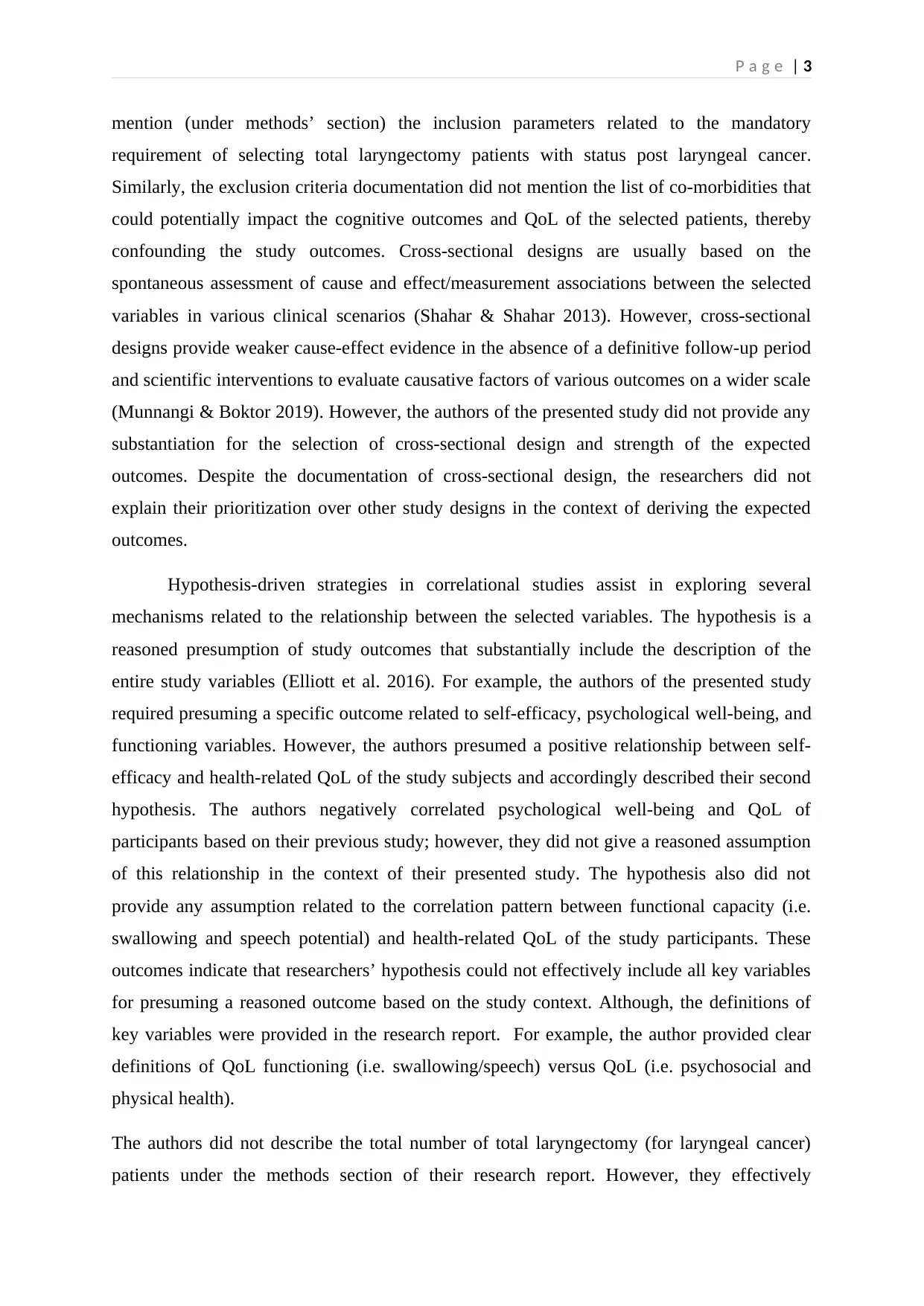
P a g e | 3
mention (under methods’ section) the inclusion parameters related to the mandatory
requirement of selecting total laryngectomy patients with status post laryngeal cancer.
Similarly, the exclusion criteria documentation did not mention the list of co-morbidities that
could potentially impact the cognitive outcomes and QoL of the selected patients, thereby
confounding the study outcomes. Cross-sectional designs are usually based on the
spontaneous assessment of cause and effect/measurement associations between the selected
variables in various clinical scenarios (Shahar & Shahar 2013). However, cross-sectional
designs provide weaker cause-effect evidence in the absence of a definitive follow-up period
and scientific interventions to evaluate causative factors of various outcomes on a wider scale
(Munnangi & Boktor 2019). However, the authors of the presented study did not provide any
substantiation for the selection of cross-sectional design and strength of the expected
outcomes. Despite the documentation of cross-sectional design, the researchers did not
explain their prioritization over other study designs in the context of deriving the expected
outcomes.
Hypothesis-driven strategies in correlational studies assist in exploring several
mechanisms related to the relationship between the selected variables. The hypothesis is a
reasoned presumption of study outcomes that substantially include the description of the
entire study variables (Elliott et al. 2016). For example, the authors of the presented study
required presuming a specific outcome related to self-efficacy, psychological well-being, and
functioning variables. However, the authors presumed a positive relationship between self-
efficacy and health-related QoL of the study subjects and accordingly described their second
hypothesis. The authors negatively correlated psychological well-being and QoL of
participants based on their previous study; however, they did not give a reasoned assumption
of this relationship in the context of their presented study. The hypothesis also did not
provide any assumption related to the correlation pattern between functional capacity (i.e.
swallowing and speech potential) and health-related QoL of the study participants. These
outcomes indicate that researchers’ hypothesis could not effectively include all key variables
for presuming a reasoned outcome based on the study context. Although, the definitions of
key variables were provided in the research report. For example, the author provided clear
definitions of QoL functioning (i.e. swallowing/speech) versus QoL (i.e. psychosocial and
physical health).
The authors did not describe the total number of total laryngectomy (for laryngeal cancer)
patients under the methods section of their research report. However, they effectively
mention (under methods’ section) the inclusion parameters related to the mandatory
requirement of selecting total laryngectomy patients with status post laryngeal cancer.
Similarly, the exclusion criteria documentation did not mention the list of co-morbidities that
could potentially impact the cognitive outcomes and QoL of the selected patients, thereby
confounding the study outcomes. Cross-sectional designs are usually based on the
spontaneous assessment of cause and effect/measurement associations between the selected
variables in various clinical scenarios (Shahar & Shahar 2013). However, cross-sectional
designs provide weaker cause-effect evidence in the absence of a definitive follow-up period
and scientific interventions to evaluate causative factors of various outcomes on a wider scale
(Munnangi & Boktor 2019). However, the authors of the presented study did not provide any
substantiation for the selection of cross-sectional design and strength of the expected
outcomes. Despite the documentation of cross-sectional design, the researchers did not
explain their prioritization over other study designs in the context of deriving the expected
outcomes.
Hypothesis-driven strategies in correlational studies assist in exploring several
mechanisms related to the relationship between the selected variables. The hypothesis is a
reasoned presumption of study outcomes that substantially include the description of the
entire study variables (Elliott et al. 2016). For example, the authors of the presented study
required presuming a specific outcome related to self-efficacy, psychological well-being, and
functioning variables. However, the authors presumed a positive relationship between self-
efficacy and health-related QoL of the study subjects and accordingly described their second
hypothesis. The authors negatively correlated psychological well-being and QoL of
participants based on their previous study; however, they did not give a reasoned assumption
of this relationship in the context of their presented study. The hypothesis also did not
provide any assumption related to the correlation pattern between functional capacity (i.e.
swallowing and speech potential) and health-related QoL of the study participants. These
outcomes indicate that researchers’ hypothesis could not effectively include all key variables
for presuming a reasoned outcome based on the study context. Although, the definitions of
key variables were provided in the research report. For example, the author provided clear
definitions of QoL functioning (i.e. swallowing/speech) versus QoL (i.e. psychosocial and
physical health).
The authors did not describe the total number of total laryngectomy (for laryngeal cancer)
patients under the methods section of their research report. However, they effectively
Paraphrase This Document
Need a fresh take? Get an instant paraphrase of this document with our AI Paraphraser
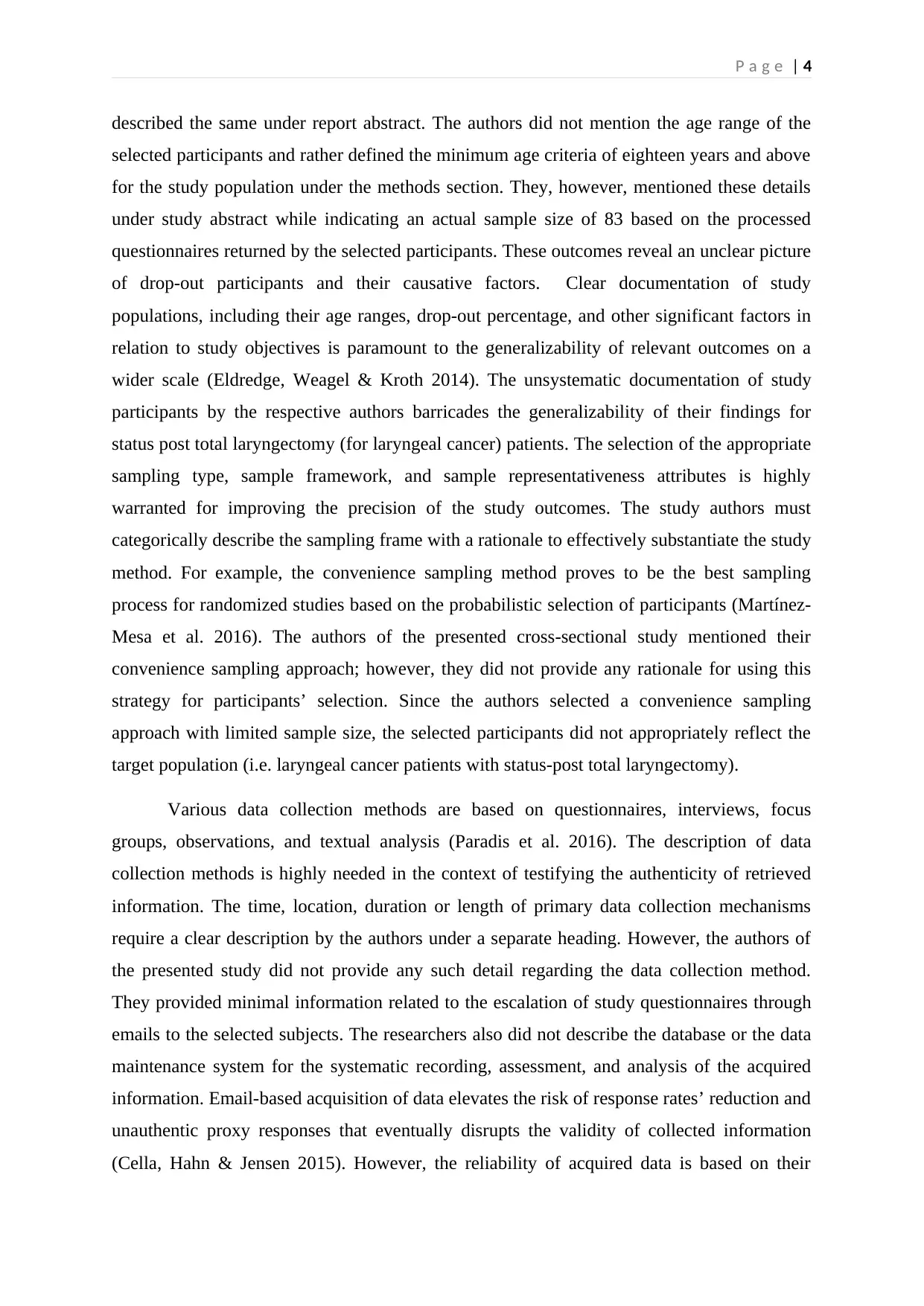
P a g e | 4
described the same under report abstract. The authors did not mention the age range of the
selected participants and rather defined the minimum age criteria of eighteen years and above
for the study population under the methods section. They, however, mentioned these details
under study abstract while indicating an actual sample size of 83 based on the processed
questionnaires returned by the selected participants. These outcomes reveal an unclear picture
of drop-out participants and their causative factors. Clear documentation of study
populations, including their age ranges, drop-out percentage, and other significant factors in
relation to study objectives is paramount to the generalizability of relevant outcomes on a
wider scale (Eldredge, Weagel & Kroth 2014). The unsystematic documentation of study
participants by the respective authors barricades the generalizability of their findings for
status post total laryngectomy (for laryngeal cancer) patients. The selection of the appropriate
sampling type, sample framework, and sample representativeness attributes is highly
warranted for improving the precision of the study outcomes. The study authors must
categorically describe the sampling frame with a rationale to effectively substantiate the study
method. For example, the convenience sampling method proves to be the best sampling
process for randomized studies based on the probabilistic selection of participants (Martínez-
Mesa et al. 2016). The authors of the presented cross-sectional study mentioned their
convenience sampling approach; however, they did not provide any rationale for using this
strategy for participants’ selection. Since the authors selected a convenience sampling
approach with limited sample size, the selected participants did not appropriately reflect the
target population (i.e. laryngeal cancer patients with status-post total laryngectomy).
Various data collection methods are based on questionnaires, interviews, focus
groups, observations, and textual analysis (Paradis et al. 2016). The description of data
collection methods is highly needed in the context of testifying the authenticity of retrieved
information. The time, location, duration or length of primary data collection mechanisms
require a clear description by the authors under a separate heading. However, the authors of
the presented study did not provide any such detail regarding the data collection method.
They provided minimal information related to the escalation of study questionnaires through
emails to the selected subjects. The researchers also did not describe the database or the data
maintenance system for the systematic recording, assessment, and analysis of the acquired
information. Email-based acquisition of data elevates the risk of response rates’ reduction and
unauthentic proxy responses that eventually disrupts the validity of collected information
(Cella, Hahn & Jensen 2015). However, the reliability of acquired data is based on their
described the same under report abstract. The authors did not mention the age range of the
selected participants and rather defined the minimum age criteria of eighteen years and above
for the study population under the methods section. They, however, mentioned these details
under study abstract while indicating an actual sample size of 83 based on the processed
questionnaires returned by the selected participants. These outcomes reveal an unclear picture
of drop-out participants and their causative factors. Clear documentation of study
populations, including their age ranges, drop-out percentage, and other significant factors in
relation to study objectives is paramount to the generalizability of relevant outcomes on a
wider scale (Eldredge, Weagel & Kroth 2014). The unsystematic documentation of study
participants by the respective authors barricades the generalizability of their findings for
status post total laryngectomy (for laryngeal cancer) patients. The selection of the appropriate
sampling type, sample framework, and sample representativeness attributes is highly
warranted for improving the precision of the study outcomes. The study authors must
categorically describe the sampling frame with a rationale to effectively substantiate the study
method. For example, the convenience sampling method proves to be the best sampling
process for randomized studies based on the probabilistic selection of participants (Martínez-
Mesa et al. 2016). The authors of the presented cross-sectional study mentioned their
convenience sampling approach; however, they did not provide any rationale for using this
strategy for participants’ selection. Since the authors selected a convenience sampling
approach with limited sample size, the selected participants did not appropriately reflect the
target population (i.e. laryngeal cancer patients with status-post total laryngectomy).
Various data collection methods are based on questionnaires, interviews, focus
groups, observations, and textual analysis (Paradis et al. 2016). The description of data
collection methods is highly needed in the context of testifying the authenticity of retrieved
information. The time, location, duration or length of primary data collection mechanisms
require a clear description by the authors under a separate heading. However, the authors of
the presented study did not provide any such detail regarding the data collection method.
They provided minimal information related to the escalation of study questionnaires through
emails to the selected subjects. The researchers also did not describe the database or the data
maintenance system for the systematic recording, assessment, and analysis of the acquired
information. Email-based acquisition of data elevates the risk of response rates’ reduction and
unauthentic proxy responses that eventually disrupts the validity of collected information
(Cella, Hahn & Jensen 2015). However, the reliability of acquired data is based on their
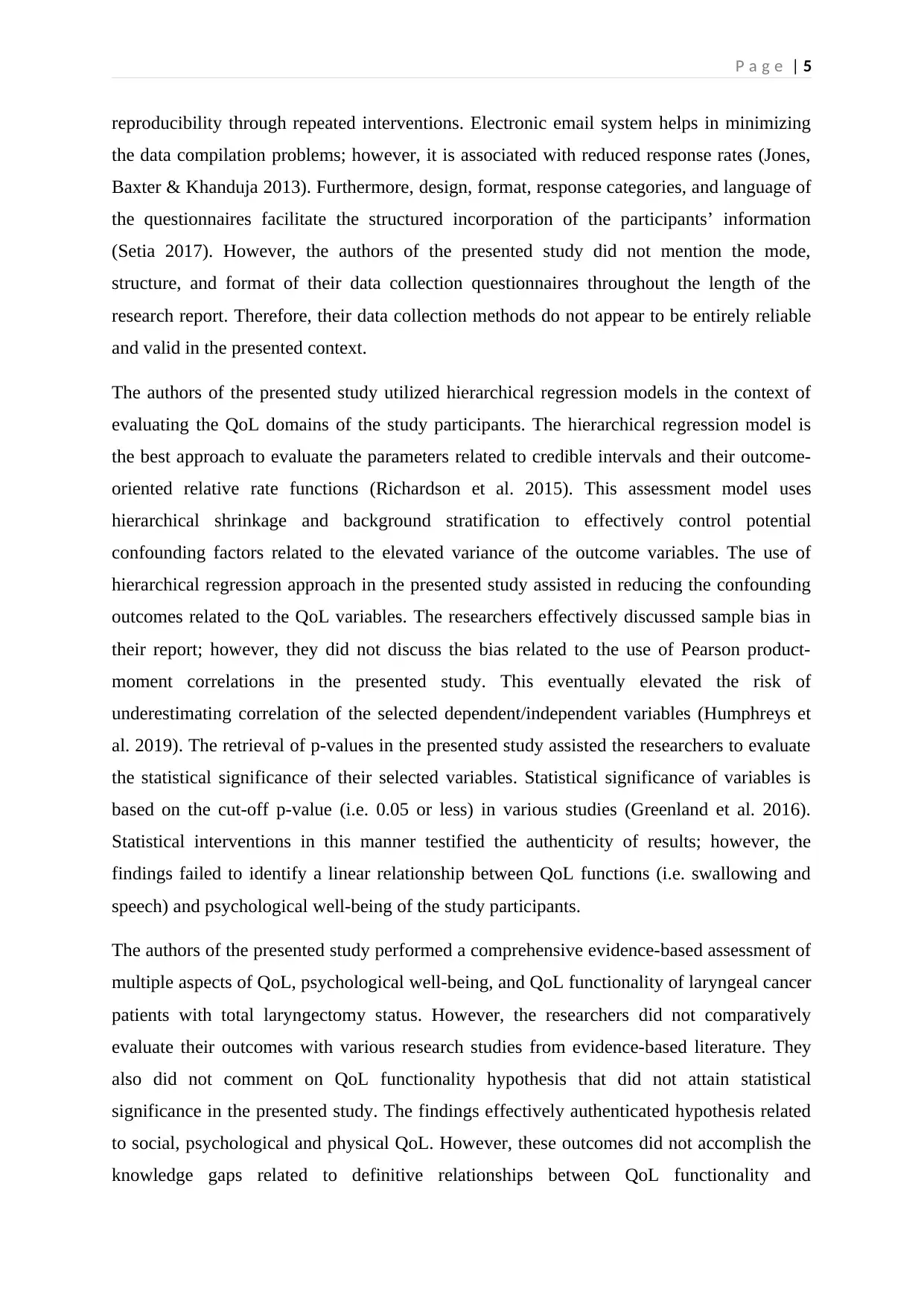
P a g e | 5
reproducibility through repeated interventions. Electronic email system helps in minimizing
the data compilation problems; however, it is associated with reduced response rates (Jones,
Baxter & Khanduja 2013). Furthermore, design, format, response categories, and language of
the questionnaires facilitate the structured incorporation of the participants’ information
(Setia 2017). However, the authors of the presented study did not mention the mode,
structure, and format of their data collection questionnaires throughout the length of the
research report. Therefore, their data collection methods do not appear to be entirely reliable
and valid in the presented context.
The authors of the presented study utilized hierarchical regression models in the context of
evaluating the QoL domains of the study participants. The hierarchical regression model is
the best approach to evaluate the parameters related to credible intervals and their outcome-
oriented relative rate functions (Richardson et al. 2015). This assessment model uses
hierarchical shrinkage and background stratification to effectively control potential
confounding factors related to the elevated variance of the outcome variables. The use of
hierarchical regression approach in the presented study assisted in reducing the confounding
outcomes related to the QoL variables. The researchers effectively discussed sample bias in
their report; however, they did not discuss the bias related to the use of Pearson product-
moment correlations in the presented study. This eventually elevated the risk of
underestimating correlation of the selected dependent/independent variables (Humphreys et
al. 2019). The retrieval of p-values in the presented study assisted the researchers to evaluate
the statistical significance of their selected variables. Statistical significance of variables is
based on the cut-off p-value (i.e. 0.05 or less) in various studies (Greenland et al. 2016).
Statistical interventions in this manner testified the authenticity of results; however, the
findings failed to identify a linear relationship between QoL functions (i.e. swallowing and
speech) and psychological well-being of the study participants.
The authors of the presented study performed a comprehensive evidence-based assessment of
multiple aspects of QoL, psychological well-being, and QoL functionality of laryngeal cancer
patients with total laryngectomy status. However, the researchers did not comparatively
evaluate their outcomes with various research studies from evidence-based literature. They
also did not comment on QoL functionality hypothesis that did not attain statistical
significance in the presented study. The findings effectively authenticated hypothesis related
to social, psychological and physical QoL. However, these outcomes did not accomplish the
knowledge gaps related to definitive relationships between QoL functionality and
reproducibility through repeated interventions. Electronic email system helps in minimizing
the data compilation problems; however, it is associated with reduced response rates (Jones,
Baxter & Khanduja 2013). Furthermore, design, format, response categories, and language of
the questionnaires facilitate the structured incorporation of the participants’ information
(Setia 2017). However, the authors of the presented study did not mention the mode,
structure, and format of their data collection questionnaires throughout the length of the
research report. Therefore, their data collection methods do not appear to be entirely reliable
and valid in the presented context.
The authors of the presented study utilized hierarchical regression models in the context of
evaluating the QoL domains of the study participants. The hierarchical regression model is
the best approach to evaluate the parameters related to credible intervals and their outcome-
oriented relative rate functions (Richardson et al. 2015). This assessment model uses
hierarchical shrinkage and background stratification to effectively control potential
confounding factors related to the elevated variance of the outcome variables. The use of
hierarchical regression approach in the presented study assisted in reducing the confounding
outcomes related to the QoL variables. The researchers effectively discussed sample bias in
their report; however, they did not discuss the bias related to the use of Pearson product-
moment correlations in the presented study. This eventually elevated the risk of
underestimating correlation of the selected dependent/independent variables (Humphreys et
al. 2019). The retrieval of p-values in the presented study assisted the researchers to evaluate
the statistical significance of their selected variables. Statistical significance of variables is
based on the cut-off p-value (i.e. 0.05 or less) in various studies (Greenland et al. 2016).
Statistical interventions in this manner testified the authenticity of results; however, the
findings failed to identify a linear relationship between QoL functions (i.e. swallowing and
speech) and psychological well-being of the study participants.
The authors of the presented study performed a comprehensive evidence-based assessment of
multiple aspects of QoL, psychological well-being, and QoL functionality of laryngeal cancer
patients with total laryngectomy status. However, the researchers did not comparatively
evaluate their outcomes with various research studies from evidence-based literature. They
also did not comment on QoL functionality hypothesis that did not attain statistical
significance in the presented study. The findings effectively authenticated hypothesis related
to social, psychological and physical QoL. However, these outcomes did not accomplish the
knowledge gaps related to definitive relationships between QoL functionality and
⊘ This is a preview!⊘
Do you want full access?
Subscribe today to unlock all pages.

Trusted by 1+ million students worldwide
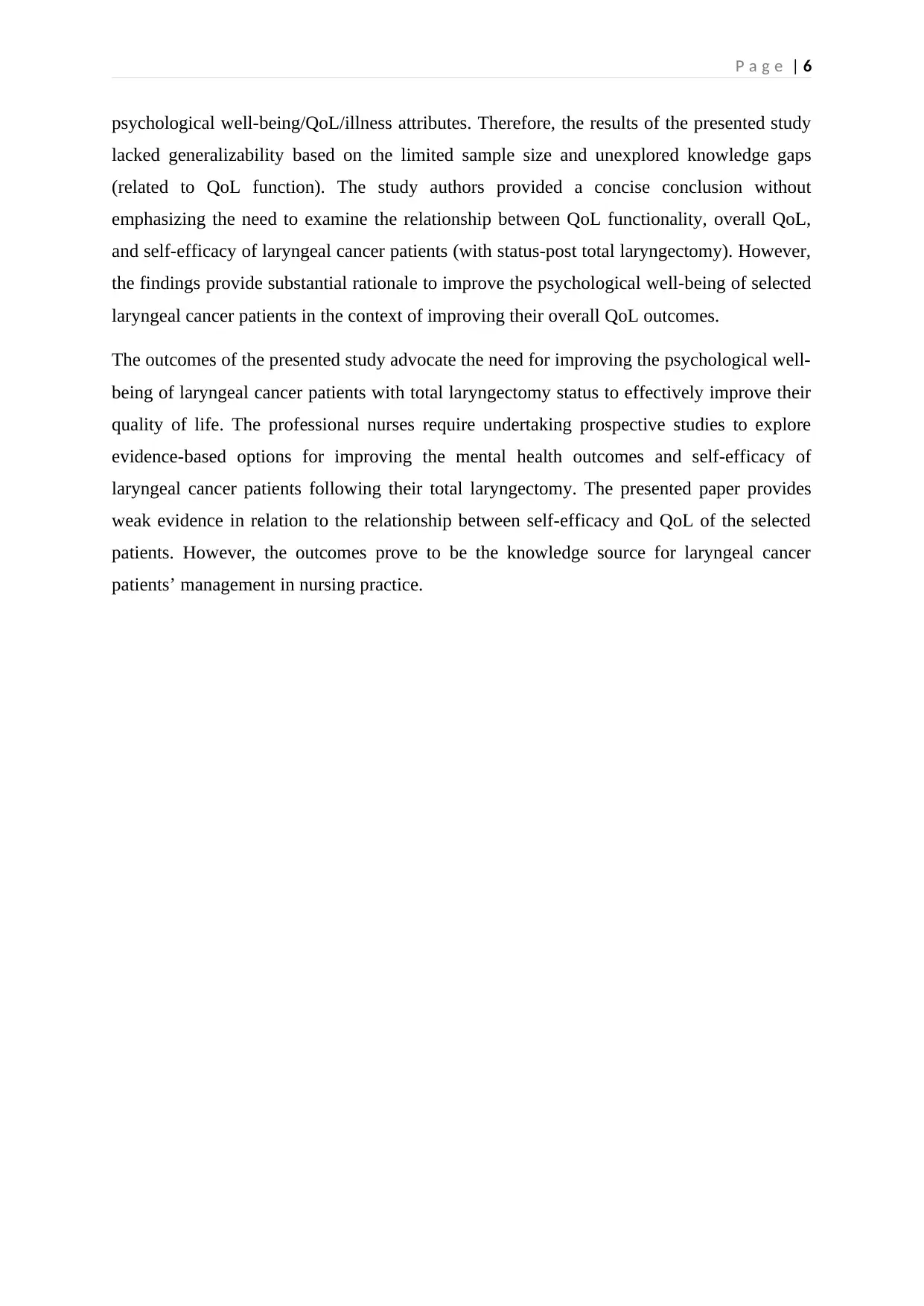
P a g e | 6
psychological well-being/QoL/illness attributes. Therefore, the results of the presented study
lacked generalizability based on the limited sample size and unexplored knowledge gaps
(related to QoL function). The study authors provided a concise conclusion without
emphasizing the need to examine the relationship between QoL functionality, overall QoL,
and self-efficacy of laryngeal cancer patients (with status-post total laryngectomy). However,
the findings provide substantial rationale to improve the psychological well-being of selected
laryngeal cancer patients in the context of improving their overall QoL outcomes.
The outcomes of the presented study advocate the need for improving the psychological well-
being of laryngeal cancer patients with total laryngectomy status to effectively improve their
quality of life. The professional nurses require undertaking prospective studies to explore
evidence-based options for improving the mental health outcomes and self-efficacy of
laryngeal cancer patients following their total laryngectomy. The presented paper provides
weak evidence in relation to the relationship between self-efficacy and QoL of the selected
patients. However, the outcomes prove to be the knowledge source for laryngeal cancer
patients’ management in nursing practice.
psychological well-being/QoL/illness attributes. Therefore, the results of the presented study
lacked generalizability based on the limited sample size and unexplored knowledge gaps
(related to QoL function). The study authors provided a concise conclusion without
emphasizing the need to examine the relationship between QoL functionality, overall QoL,
and self-efficacy of laryngeal cancer patients (with status-post total laryngectomy). However,
the findings provide substantial rationale to improve the psychological well-being of selected
laryngeal cancer patients in the context of improving their overall QoL outcomes.
The outcomes of the presented study advocate the need for improving the psychological well-
being of laryngeal cancer patients with total laryngectomy status to effectively improve their
quality of life. The professional nurses require undertaking prospective studies to explore
evidence-based options for improving the mental health outcomes and self-efficacy of
laryngeal cancer patients following their total laryngectomy. The presented paper provides
weak evidence in relation to the relationship between self-efficacy and QoL of the selected
patients. However, the outcomes prove to be the knowledge source for laryngeal cancer
patients’ management in nursing practice.
Paraphrase This Document
Need a fresh take? Get an instant paraphrase of this document with our AI Paraphraser
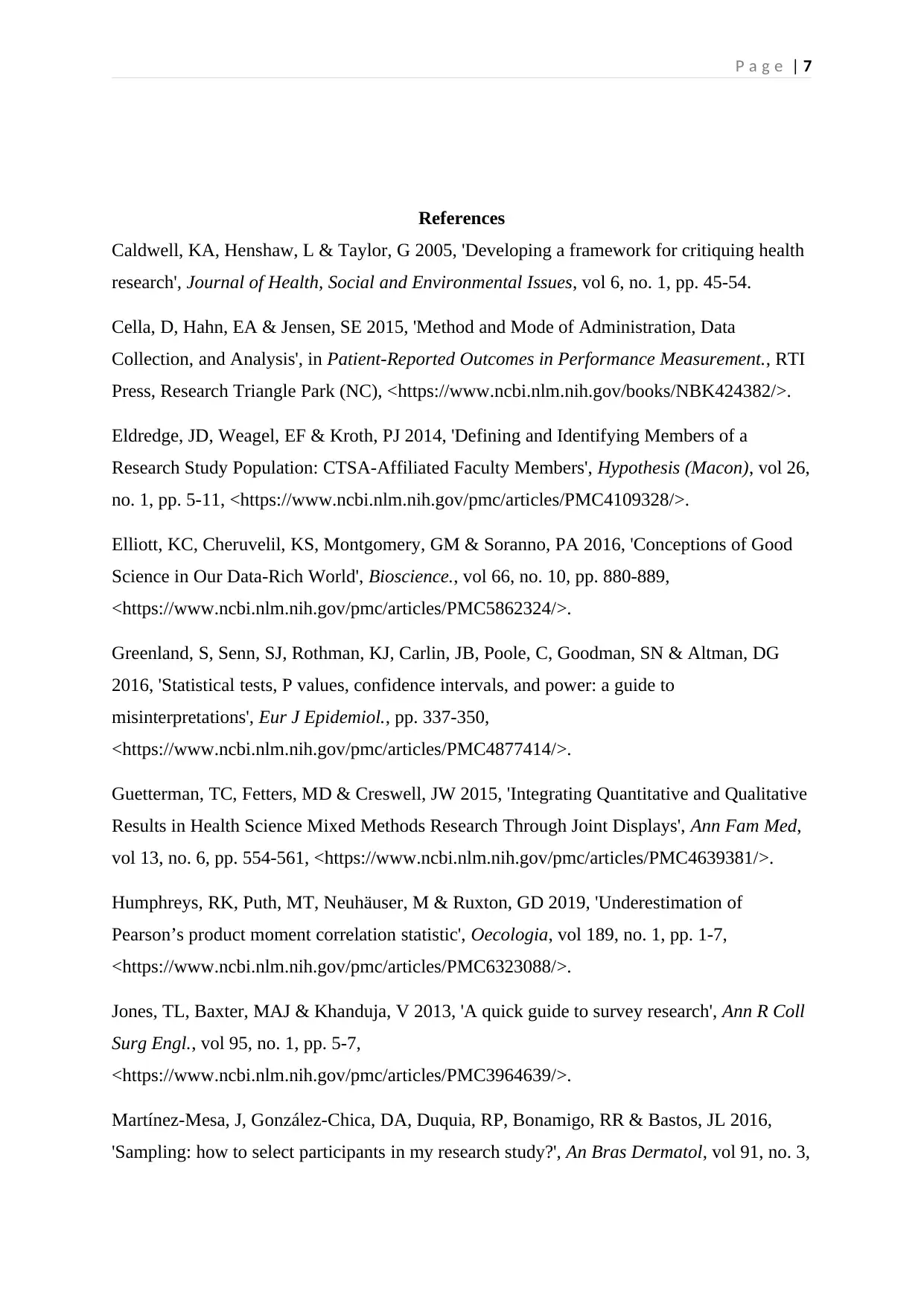
P a g e | 7
References
Caldwell, KA, Henshaw, L & Taylor, G 2005, 'Developing a framework for critiquing health
research', Journal of Health, Social and Environmental Issues, vol 6, no. 1, pp. 45-54.
Cella, D, Hahn, EA & Jensen, SE 2015, 'Method and Mode of Administration, Data
Collection, and Analysis', in Patient-Reported Outcomes in Performance Measurement., RTI
Press, Research Triangle Park (NC), <https://www.ncbi.nlm.nih.gov/books/NBK424382/>.
Eldredge, JD, Weagel, EF & Kroth, PJ 2014, 'Defining and Identifying Members of a
Research Study Population: CTSA-Affiliated Faculty Members', Hypothesis (Macon), vol 26,
no. 1, pp. 5-11, <https://www.ncbi.nlm.nih.gov/pmc/articles/PMC4109328/>.
Elliott, KC, Cheruvelil, KS, Montgomery, GM & Soranno, PA 2016, 'Conceptions of Good
Science in Our Data-Rich World', Bioscience., vol 66, no. 10, pp. 880-889,
<https://www.ncbi.nlm.nih.gov/pmc/articles/PMC5862324/>.
Greenland, S, Senn, SJ, Rothman, KJ, Carlin, JB, Poole, C, Goodman, SN & Altman, DG
2016, 'Statistical tests, P values, confidence intervals, and power: a guide to
misinterpretations', Eur J Epidemiol., pp. 337-350,
<https://www.ncbi.nlm.nih.gov/pmc/articles/PMC4877414/>.
Guetterman, TC, Fetters, MD & Creswell, JW 2015, 'Integrating Quantitative and Qualitative
Results in Health Science Mixed Methods Research Through Joint Displays', Ann Fam Med,
vol 13, no. 6, pp. 554-561, <https://www.ncbi.nlm.nih.gov/pmc/articles/PMC4639381/>.
Humphreys, RK, Puth, MT, Neuhäuser, M & Ruxton, GD 2019, 'Underestimation of
Pearson’s product moment correlation statistic', Oecologia, vol 189, no. 1, pp. 1-7,
<https://www.ncbi.nlm.nih.gov/pmc/articles/PMC6323088/>.
Jones, TL, Baxter, MAJ & Khanduja, V 2013, 'A quick guide to survey research', Ann R Coll
Surg Engl., vol 95, no. 1, pp. 5-7,
<https://www.ncbi.nlm.nih.gov/pmc/articles/PMC3964639/>.
Martínez-Mesa, J, González-Chica, DA, Duquia, RP, Bonamigo, RR & Bastos, JL 2016,
'Sampling: how to select participants in my research study?', An Bras Dermatol, vol 91, no. 3,
References
Caldwell, KA, Henshaw, L & Taylor, G 2005, 'Developing a framework for critiquing health
research', Journal of Health, Social and Environmental Issues, vol 6, no. 1, pp. 45-54.
Cella, D, Hahn, EA & Jensen, SE 2015, 'Method and Mode of Administration, Data
Collection, and Analysis', in Patient-Reported Outcomes in Performance Measurement., RTI
Press, Research Triangle Park (NC), <https://www.ncbi.nlm.nih.gov/books/NBK424382/>.
Eldredge, JD, Weagel, EF & Kroth, PJ 2014, 'Defining and Identifying Members of a
Research Study Population: CTSA-Affiliated Faculty Members', Hypothesis (Macon), vol 26,
no. 1, pp. 5-11, <https://www.ncbi.nlm.nih.gov/pmc/articles/PMC4109328/>.
Elliott, KC, Cheruvelil, KS, Montgomery, GM & Soranno, PA 2016, 'Conceptions of Good
Science in Our Data-Rich World', Bioscience., vol 66, no. 10, pp. 880-889,
<https://www.ncbi.nlm.nih.gov/pmc/articles/PMC5862324/>.
Greenland, S, Senn, SJ, Rothman, KJ, Carlin, JB, Poole, C, Goodman, SN & Altman, DG
2016, 'Statistical tests, P values, confidence intervals, and power: a guide to
misinterpretations', Eur J Epidemiol., pp. 337-350,
<https://www.ncbi.nlm.nih.gov/pmc/articles/PMC4877414/>.
Guetterman, TC, Fetters, MD & Creswell, JW 2015, 'Integrating Quantitative and Qualitative
Results in Health Science Mixed Methods Research Through Joint Displays', Ann Fam Med,
vol 13, no. 6, pp. 554-561, <https://www.ncbi.nlm.nih.gov/pmc/articles/PMC4639381/>.
Humphreys, RK, Puth, MT, Neuhäuser, M & Ruxton, GD 2019, 'Underestimation of
Pearson’s product moment correlation statistic', Oecologia, vol 189, no. 1, pp. 1-7,
<https://www.ncbi.nlm.nih.gov/pmc/articles/PMC6323088/>.
Jones, TL, Baxter, MAJ & Khanduja, V 2013, 'A quick guide to survey research', Ann R Coll
Surg Engl., vol 95, no. 1, pp. 5-7,
<https://www.ncbi.nlm.nih.gov/pmc/articles/PMC3964639/>.
Martínez-Mesa, J, González-Chica, DA, Duquia, RP, Bonamigo, RR & Bastos, JL 2016,
'Sampling: how to select participants in my research study?', An Bras Dermatol, vol 91, no. 3,
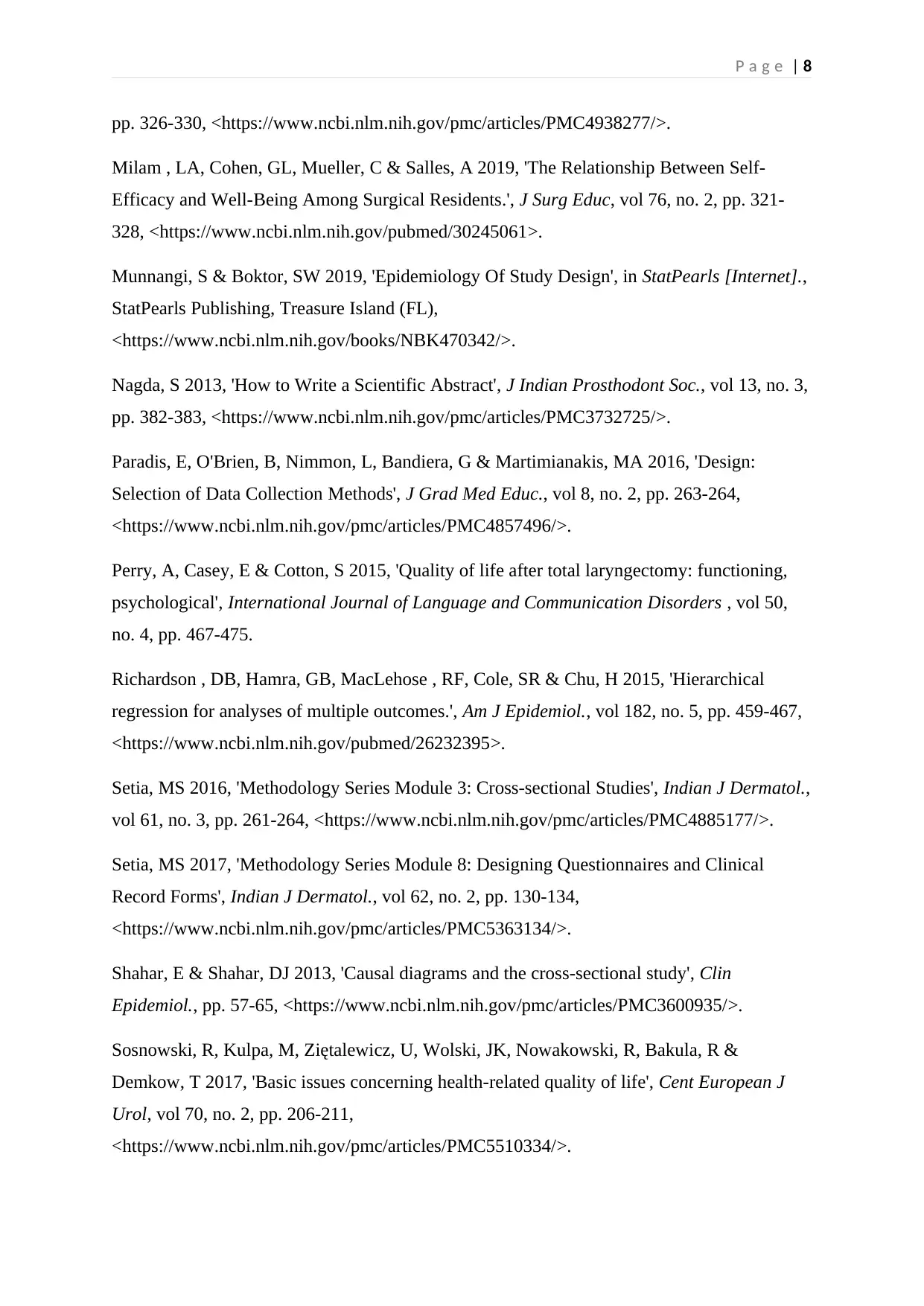
P a g e | 8
pp. 326-330, <https://www.ncbi.nlm.nih.gov/pmc/articles/PMC4938277/>.
Milam , LA, Cohen, GL, Mueller, C & Salles, A 2019, 'The Relationship Between Self-
Efficacy and Well-Being Among Surgical Residents.', J Surg Educ, vol 76, no. 2, pp. 321-
328, <https://www.ncbi.nlm.nih.gov/pubmed/30245061>.
Munnangi, S & Boktor, SW 2019, 'Epidemiology Of Study Design', in StatPearls [Internet].,
StatPearls Publishing, Treasure Island (FL),
<https://www.ncbi.nlm.nih.gov/books/NBK470342/>.
Nagda, S 2013, 'How to Write a Scientific Abstract', J Indian Prosthodont Soc., vol 13, no. 3,
pp. 382-383, <https://www.ncbi.nlm.nih.gov/pmc/articles/PMC3732725/>.
Paradis, E, O'Brien, B, Nimmon, L, Bandiera, G & Martimianakis, MA 2016, 'Design:
Selection of Data Collection Methods', J Grad Med Educ., vol 8, no. 2, pp. 263-264,
<https://www.ncbi.nlm.nih.gov/pmc/articles/PMC4857496/>.
Perry, A, Casey, E & Cotton, S 2015, 'Quality of life after total laryngectomy: functioning,
psychological', International Journal of Language and Communication Disorders , vol 50,
no. 4, pp. 467-475.
Richardson , DB, Hamra, GB, MacLehose , RF, Cole, SR & Chu, H 2015, 'Hierarchical
regression for analyses of multiple outcomes.', Am J Epidemiol., vol 182, no. 5, pp. 459-467,
<https://www.ncbi.nlm.nih.gov/pubmed/26232395>.
Setia, MS 2016, 'Methodology Series Module 3: Cross-sectional Studies', Indian J Dermatol.,
vol 61, no. 3, pp. 261-264, <https://www.ncbi.nlm.nih.gov/pmc/articles/PMC4885177/>.
Setia, MS 2017, 'Methodology Series Module 8: Designing Questionnaires and Clinical
Record Forms', Indian J Dermatol., vol 62, no. 2, pp. 130-134,
<https://www.ncbi.nlm.nih.gov/pmc/articles/PMC5363134/>.
Shahar, E & Shahar, DJ 2013, 'Causal diagrams and the cross-sectional study', Clin
Epidemiol., pp. 57-65, <https://www.ncbi.nlm.nih.gov/pmc/articles/PMC3600935/>.
Sosnowski, R, Kulpa, M, Ziętalewicz, U, Wolski, JK, Nowakowski, R, Bakula, R &
Demkow, T 2017, 'Basic issues concerning health-related quality of life', Cent European J
Urol, vol 70, no. 2, pp. 206-211,
<https://www.ncbi.nlm.nih.gov/pmc/articles/PMC5510334/>.
pp. 326-330, <https://www.ncbi.nlm.nih.gov/pmc/articles/PMC4938277/>.
Milam , LA, Cohen, GL, Mueller, C & Salles, A 2019, 'The Relationship Between Self-
Efficacy and Well-Being Among Surgical Residents.', J Surg Educ, vol 76, no. 2, pp. 321-
328, <https://www.ncbi.nlm.nih.gov/pubmed/30245061>.
Munnangi, S & Boktor, SW 2019, 'Epidemiology Of Study Design', in StatPearls [Internet].,
StatPearls Publishing, Treasure Island (FL),
<https://www.ncbi.nlm.nih.gov/books/NBK470342/>.
Nagda, S 2013, 'How to Write a Scientific Abstract', J Indian Prosthodont Soc., vol 13, no. 3,
pp. 382-383, <https://www.ncbi.nlm.nih.gov/pmc/articles/PMC3732725/>.
Paradis, E, O'Brien, B, Nimmon, L, Bandiera, G & Martimianakis, MA 2016, 'Design:
Selection of Data Collection Methods', J Grad Med Educ., vol 8, no. 2, pp. 263-264,
<https://www.ncbi.nlm.nih.gov/pmc/articles/PMC4857496/>.
Perry, A, Casey, E & Cotton, S 2015, 'Quality of life after total laryngectomy: functioning,
psychological', International Journal of Language and Communication Disorders , vol 50,
no. 4, pp. 467-475.
Richardson , DB, Hamra, GB, MacLehose , RF, Cole, SR & Chu, H 2015, 'Hierarchical
regression for analyses of multiple outcomes.', Am J Epidemiol., vol 182, no. 5, pp. 459-467,
<https://www.ncbi.nlm.nih.gov/pubmed/26232395>.
Setia, MS 2016, 'Methodology Series Module 3: Cross-sectional Studies', Indian J Dermatol.,
vol 61, no. 3, pp. 261-264, <https://www.ncbi.nlm.nih.gov/pmc/articles/PMC4885177/>.
Setia, MS 2017, 'Methodology Series Module 8: Designing Questionnaires and Clinical
Record Forms', Indian J Dermatol., vol 62, no. 2, pp. 130-134,
<https://www.ncbi.nlm.nih.gov/pmc/articles/PMC5363134/>.
Shahar, E & Shahar, DJ 2013, 'Causal diagrams and the cross-sectional study', Clin
Epidemiol., pp. 57-65, <https://www.ncbi.nlm.nih.gov/pmc/articles/PMC3600935/>.
Sosnowski, R, Kulpa, M, Ziętalewicz, U, Wolski, JK, Nowakowski, R, Bakula, R &
Demkow, T 2017, 'Basic issues concerning health-related quality of life', Cent European J
Urol, vol 70, no. 2, pp. 206-211,
<https://www.ncbi.nlm.nih.gov/pmc/articles/PMC5510334/>.
⊘ This is a preview!⊘
Do you want full access?
Subscribe today to unlock all pages.

Trusted by 1+ million students worldwide

P a g e | 9
1 out of 10
Your All-in-One AI-Powered Toolkit for Academic Success.
+13062052269
info@desklib.com
Available 24*7 on WhatsApp / Email
![[object Object]](/_next/static/media/star-bottom.7253800d.svg)
Unlock your academic potential
Copyright © 2020–2026 A2Z Services. All Rights Reserved. Developed and managed by ZUCOL.
